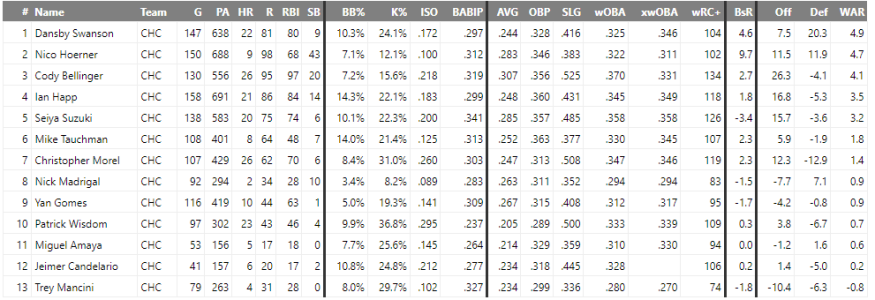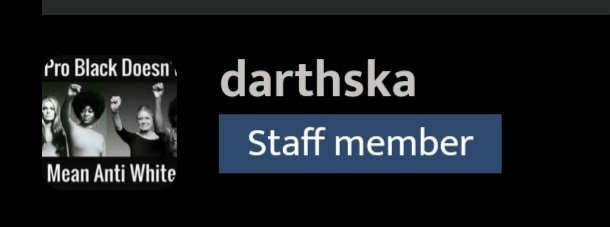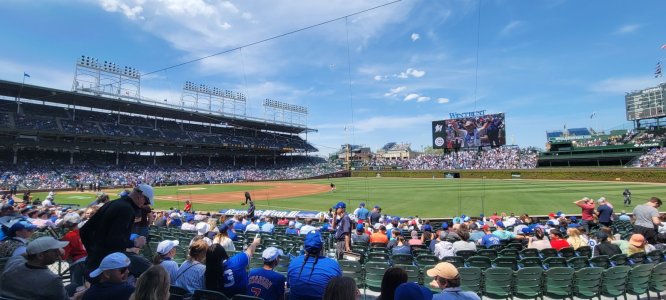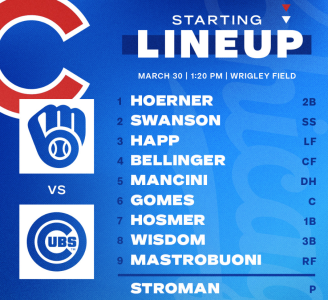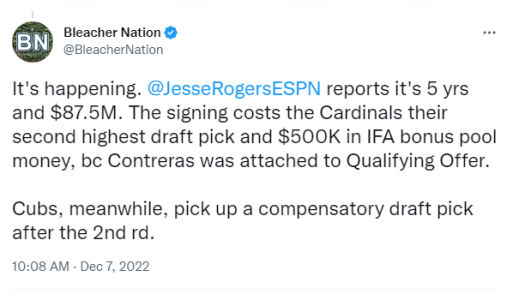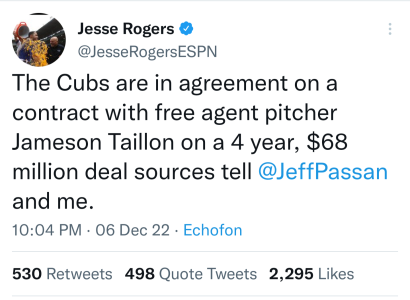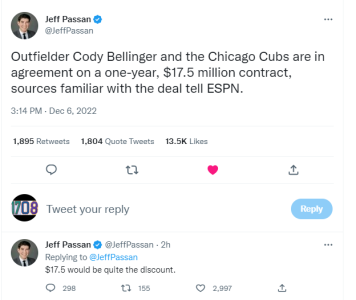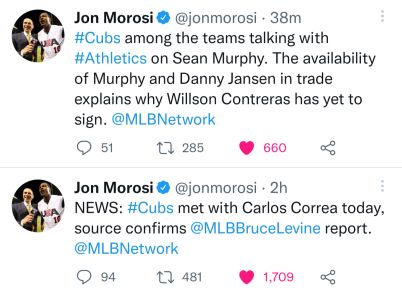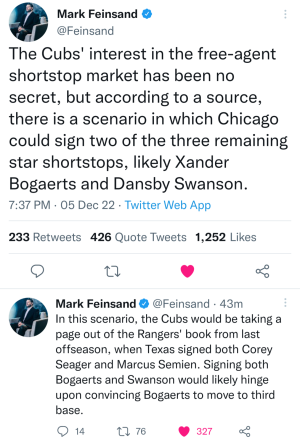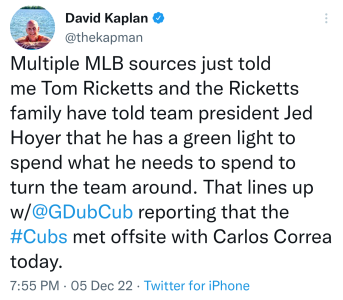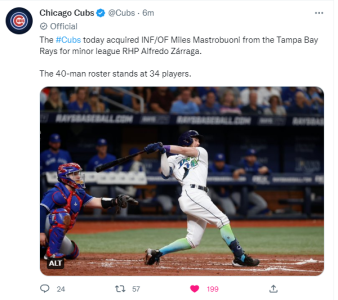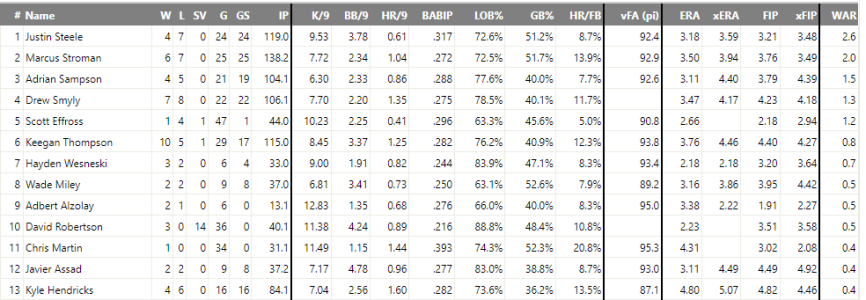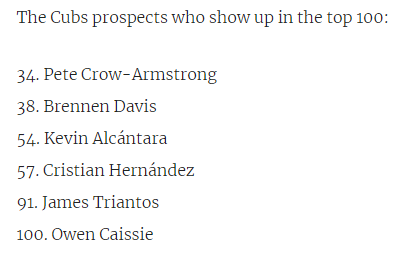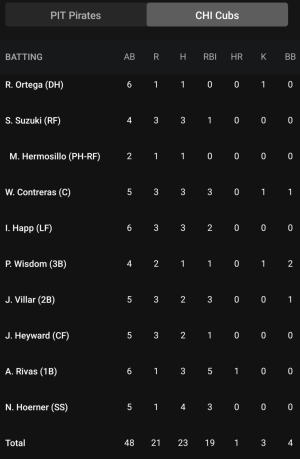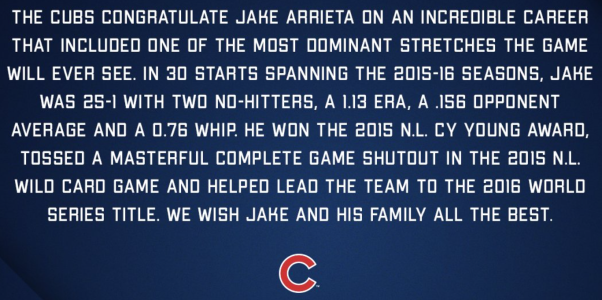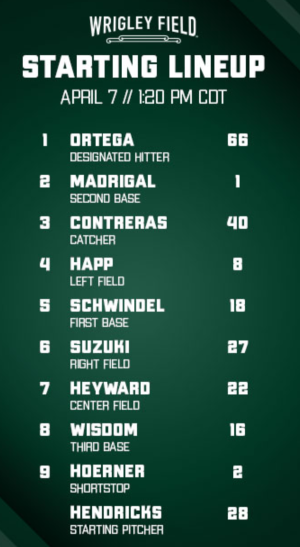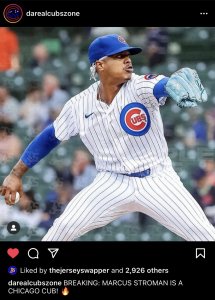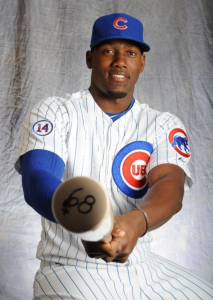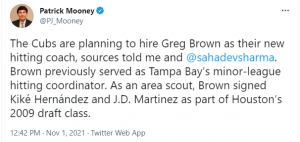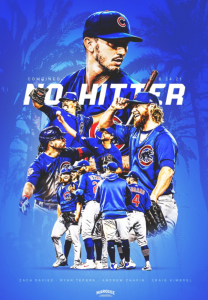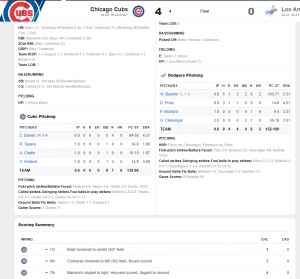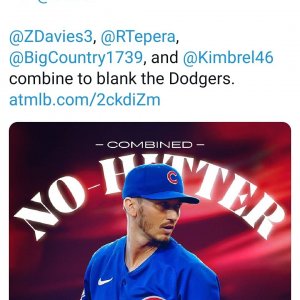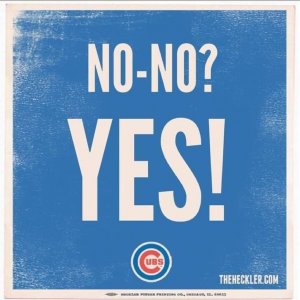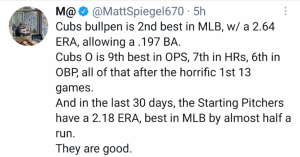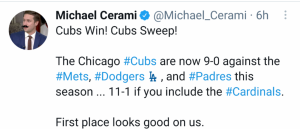Navigation
Install the app
How to install the app on iOS
Follow along with the video below to see how to install our site as a web app on your home screen.

Note: this_feature_currently_requires_accessing_site_using_safari
More options
You are using an out of date browser. It may not display this or other websites correctly.
You should upgrade or use an alternative browser.
You should upgrade or use an alternative browser.
Official 2023 Chicago Cubs Season Thread Vol: (17-17)
- Thread in 'Sports & Training' Thread starter Started by CP1708,
- Start date
arstyle27
Supporter
- 10,276
- 3,321
- Joined
- Nov 13, 2001
This one felt good. Whoooooooooooooooooooooo!!!
arstyle27
Supporter
- 10,276
- 3,321
- Joined
- Nov 13, 2001
Nice to see the offense rollin again, especially after that long game last night.
- 1,888
- 504
- Joined
- Sep 7, 2011
The bats hot today. Rizzo with the little league HR
- 1,888
- 504
- Joined
- Sep 7, 2011
Javier with the nice Double Play!!!!!. i like how hard he plays.
As it pertains to the Cubs, specifically, Olney hears from one person in position to know who expects that the Yankees will ask the Cubs for Kyle Schwarber in an Andrew Miller deal, and, if the Cubs decline, the Yankees will move on.


 Go **** yourselves Yankees.
Go **** yourselves Yankees.Lake Shore Drive
formerly slp product
- 7,336
- 2,445
- Joined
- Feb 8, 2005
Yanks 
We gave those scumbags Castro for peanuts and now they think they can fleece us for Kyle....no way Theo and Jed trade him.
Almora with his first career HR.
Rizzo with a 3run inside the park HR.



We gave those scumbags Castro for peanuts and now they think they can fleece us for Kyle....no way Theo and Jed trade him.
Almora with his first career HR.

Rizzo with a 3run inside the park HR.



Last edited:
- 1,888
- 504
- Joined
- Sep 7, 2011
Cubs Sweep!!!!! on to the Mets!!!!
Welcome to the new and improved MLB Future Power Rankings! We've decided to change our approach since the last time we updated these last November. We tweaked the categories and their weights in our total score for each team. We added a few relevant notes per team (such as best year to win a championship and worst contract). And we even changed the writer/ranker; master projector Dan Szymborski and his ZiPS system now provide the rank and snapshot of each franchise.
So what are the Future Power Rankings? Simply put, they're an attempt to measure how well each team is set up for sustained success over the next five years.
We obviously can't project yet which team will be the best in baseball in 2030, but the near future is reaped from the seeds sowed in the present. What's to come is always uncertain, but after a century and a half of organized professional baseball, we have a pretty good idea what factors commonly lead to future success. To get an estimated score for each team, we distilled the information available into four main categories:
Current talent (25 percent of total score): This category focuses on the in-organization performance that teams are projected to have available from now until the end of the 2017 season. This is the easiest to gauge because of the shorter time horizon involved. A club's 2016 performance may not necessarily be around in 2020, so current talent is not as heavily weighted as future talent, but players who contribute now can bring in future performance.
Future talent (45 percent): This covers every bit of projected performance that teams have in their organization from 2018 onward, from veterans under contract to young major leaguers to this year's draftees. With more uncertainty, computer projections are more fallible than in the near term; to take this into consideration, I've also implemented Keith Law's farm system rankings.
Financial support (20 percent): Poor teams -- or more accurately, less-rich teams -- can in fact compete, but it would be naive to pretend that it's not trickier to keep a team like the Pittsburgh Pirates or Tampa Bay Rays in contention than the Los Angeles Dodgers. This category was developed with an index that includes historical team payrolls relative to team revenue, revenue streams and market size.
Front office (10 percent): This is a small weight, both because of the subjective nature of ranking them and because a lot of a front office's abilities are naturally going to be reflected in the current talent, future talent and, at least indirectly, the team's recent revenue. Also, building a team is more than just making a lot of good moves; it's also about having a coherent plan and using creativity and flexibility to further those plans.
Overall score: We basically rank the categories from 1 (the best) to 30 (worst), then apply our category weights. So a perfect score would be 30 (first in all four categories).
Tiebreaker: When two teams ended up with the same overall score, we used the best rank in the "Future talent" area to determine which team should be ranked higher.
No previous rank? Because so much has changed, from the categories to the category weights to even the ranker, we've decided not to compare these to the November rank. However, one thing remains the same between the two sets of rankings ...
Cubs retain top spot
While it's not the landslide it was in the November rankings, the Cubs are still numero uno. The objective for all big league front offices is to build the strongest possible organization. That's exactly what the Cubs have done.
Let's start with the major league roster. Even after missing out on the top free-agent pitchers this past offseason and losing their starting left fielder to a season-ending knee injury before the season even began, the Cubs have the strongest case for the best major league talent right now. ZiPS has their current roster with the best true-talent winning percentage in baseball from here on out, at .611, which is the best performance by any roster by ZiPS' estimation since the 2011 Yankees. Considering the Cubs have the best winning percentage so far, that's not exactly a computer giving counterintuitive analysis. But believe it or not, they've actually underperformed their run differential; an argument can be made that they've played more like a .700 team this year.
What's truly amazing about the Cubs is they have done this all without being an ancient team that sacrificed its future for present gains. Sure, Arodys Vizcaino would look nice in their bullpen right now, as would Zack Godley, but the Cubs built this roster retaining essentially all of their young talent. In fact, all top 10 players from Keith Law's top Cubs prospects heading into 2015 remain in the organization, as do eight of the 10 players on Law's 2014 list (Vizcaino and Arismendy Alcantara are the only ones missing). And that's just the farm system. In the majors are many graduated prospects with long major league careers ahead of them, players like Kris Bryant, Addison Russell, Javier Baez and the injured Kyle Schwarber.
Supporting this bevy of current and future talent is an organization that has shown every indication that it will provide ample financial support to maintain its juggernaut status. When the Ricketts purchased the Cubs, many soothsayers predicted gloom and doom, saying they would never invest in the team. Turned out they weren't cheap; they were patient. Since the Cubs started to shift aggressively from rebuilding mode to contention after the 2014 season, they've brought in Jason Heyward, Jon Lester, Ben Zobrist, Miguel Montero, Dexter Fowler and John Lackey, among others.
President of baseball operations Theo Epstein built his reputation dispelling one curse in Boston, and now he's working on lifting the hex from the Cubs. Even as a much bigger name starting his Cubs career than his Red Sox career, Epstein started off not by being flashy, but by patiently taking the long road, ignoring the people who wanted quick fixes, and implementing the rebuilding process that is paying dividends today.
Cubs, Cubs, Cubs ... We'll be hearing about them aplenty over the next five years.
With that, here are the Future Power Rankings:
1. Chicago Cubs (Score: 29.0)
CATEGORY RANK/ANSWER
Current strength 1
Future strength 1
Financial support 6
Front office 1
Percent of max possible 97%
Best projected season 2016
Most valuable asset Kris Bryant
Worst contract Jason Heyward
No, they have not won a World Series yet. But yes, the Cubs are the strongest organization in baseball right now. World Series championships are decided every fall based on a few breaks going one way or the other. An organization cannot build around those chances, but what an organization can do is build the best roster possible. That's what the Cubs have -- the strongest roster in baseball.
But what gives the Cubs the top spot here isn't just the roster they have, but the legs their roster has. Players like Kris Bryant and Addison Russell are still at the beginning of their careers, and the team retains an excellent farm system, even if it's no longer as deep as that of teams like the Braves or Twins. Add in a willingness to spend money -- the people claiming that the Ricketts family would never spend money have had to eat a hefty helping of crow -- and a front office head (Theo Epstein) who already broke one curse in Boston, and you have the most dangerous team in baseball over the next several years. Whether the Cubs win a championship or not is in the hands of baseball's oft-cruel gods.
Lake Shore Drive
formerly slp product
- 7,336
- 2,445
- Joined
- Feb 8, 2005
Not this again.....
Feels like I'm watching re-run

Feels like I'm watching re-run


******* pathetic loss. Up 3-0, fall down 4-3, then get 2nd and 3rd nobody out in the 9th with Bryant, Rizzo, Contreras up, Baez, nothing.

Terrible.
Get Peralta the **** outta here. Joe gotta stop with these loser *** relievers. Should have been Strop/Cahill in the 7th-8th, not Peralta.

Terrible.
Get Peralta the **** outta here. Joe gotta stop with these loser *** relievers. Should have been Strop/Cahill in the 7th-8th, not Peralta.

- 1,405
- 397
- Joined
- Jul 16, 2006
Game was lit I'm still mad I watched them lose in NY smh
- 1,888
- 504
- Joined
- Sep 7, 2011
somethings i just don't understand
- 9,064
- 1,157
- Joined
- Jun 26, 2009
This series is making me pull my hair out...Nothing working at all (hitting, pitching, bullpen...nada). 





- 1,888
- 504
- Joined
- Sep 7, 2011
The Mets seems to own us right now. we have to take the next 2 games. Goodness
- 864
- 333
- Joined
- Apr 9, 2014
I'm sure I'm the minority, but while these losses suck, I can't help but not be to upset by them. A couple games ago with two on and no outs, that bugged me but part of me is thinking "get it outta your system now" because the playoffs are a different beast. The problem is as fans, we have been so spoiled, we expect the Cubs to win them all. I couldn't care less about the record of winning the most games or any of that. Just want the Cubs to win the WS. Some help in the bullpen wouldn't hurt anything either.
Another vet to the DL (Coghlan)
Another rookie called up (Candelario)
Soler, Fowler, LaStella, Richard, Schwarber all on DL from opening day, and Warren down to get extended for a couple spot starts.
There's your answer as to why this scuffling.
Rookies Contreras, Almora, Candelario, Edwards, Patton, Concepción getting a lot of time. Will help in long run, just gotta grind thru it.
Another rookie called up (Candelario)
Soler, Fowler, LaStella, Richard, Schwarber all on DL from opening day, and Warren down to get extended for a couple spot starts.
There's your answer as to why this scuffling.
Rookies Contreras, Almora, Candelario, Edwards, Patton, Concepción getting a lot of time. Will help in long run, just gotta grind thru it.
- 9,064
- 1,157
- Joined
- Jun 26, 2009
This team has been so hard to watch the past month. Getting dicked down by the Mets again. 


So many times I've felt like throwing my remote at the TV. No offense and ****** pitching with a mediocre bullpen. Unreal.



So many times I've felt like throwing my remote at the TV. No offense and ****** pitching with a mediocre bullpen. Unreal.
- 1,405
- 397
- Joined
- Jul 16, 2006
What an awful weekend to be a cubs fan in NY :smh



